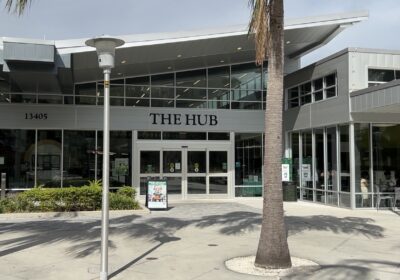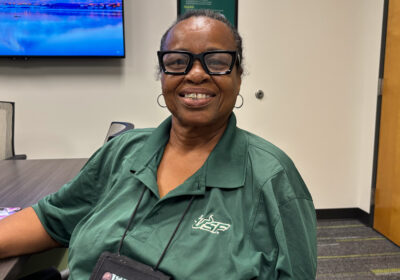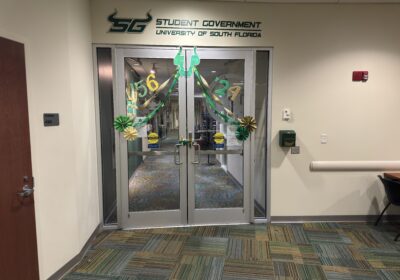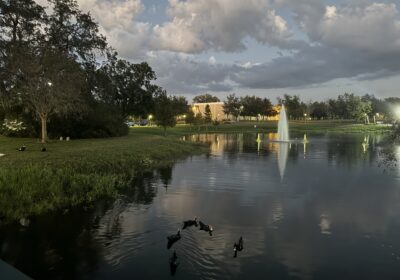When seeing is believing

Arben Kabashi gave a speech at this year’s Muma College of Business scholarship luncheon, where he received two scholarships.
SPECIAL TO THE ORACLE
When the schools in Arben Kabashi’s native Kosovo were shut down before he could finish, he thought his chances for education were over.
Now, at 37 years old, he is finishing his bachelor’s in finance at USF’s Muma College of Business, an opportunity he said he feels can’t quite be put into words.
At the Muma College of Business Scholarship luncheon, Kabashi received the SunTrust Bank scholarship and the Arthur Ringness scholarship, which will help him on his way to completing his degree. He expects to graduate in spring of 2017.
During the Yugoslav Wars, schools were shut down and people were displaced as part of ethnic cleansing. Kabashi and his family later fled the area to the U.S. to escape the conflict.
That was 17 years ago.
“It wasn’t easy,” he said. “You come into a new country, you left everything (back in Kosovo). I mean we didn’t have much.
“We lost all that we had but … (Kosovo) was a place where you learned everything. You learn there to cry, to laugh, to talk, but then after I came here, and it’s different.”
His family was not wealthy in Kosovo. Kabashi said in a speech at the 2016 Muma College of Business Scholarship Luncheon that he and a few of his five siblings would collect wild mushrooms to sell for things like clothing and school supplies.
Then the war began, taking away the family’s income and eventually forcing them into an internment camp. They were moved to the camp twelve days before the war ended.
Later, NATO forces would come through to liberate Kosovo and the International Organization for Migration gave refugees assistance in either rebuilding their homes and lives in Kosovo or leaving to start a new life elsewhere.
Kabashi’s family chose to go to the U.S.
Lutheran Social Services provided help finding housing, English-learning services and other resources like water and medicine to resist the Florida heat when they first arrived. They settled in Jacksonville. Among them was his then-74-year-old grandmother, who pass away from cancer not long after.
“… Just imagine (a) 70-year-old woman who comes here and sees all the opportunities,” he said. “When you (asked) her ‘Do you like this place?’ her answer was ‘I wish I was young to enjoy all these opportunities.
“She didn’t have a driver’s license or know how to drive a car, but she was sure she could’ve done it.”
Kabashi worked as a plumber and in other manual labor jobs. He got married and now has three children: a daughter and two sons. He became a citizen.
Things were going well, he said, until he got into an accident and injured his back. He was 32 at the time, and his wife was pregnant with their first child. No longer able to perform manual labor and without a high school diploma, Kabashi had to search for other options.
“That’s the only thing I (knew) how to do,” he said.
The option to continue his education came along while he was helping translate for his brother-in-law, who had moved to Tampa to get a Ph.D. in physics from USF.
While his brother-in-law took a course at a local high school to learn English, Kabashi began talking to the teacher there, who introduced him to the GED. He also toured USF with his brother-in-law.
When he realized that he could go back to school, things changed.
“It all comes down to the system,” he said. “The people who work hard in this country, it’s like they think for everybody. They always have the answer, even for those like me (who) dropped the school and never thought of going back. They somehow find a way to leave the door open for people and it’s just amazing.”
Kabashi returned to school and got his GED. Later, he got his associate’s from a community college. After that, he enrolled at USF to get his degree in finance. He said he chose finance because it is a degree with versatility, so he’ll have more options for employment after he graduates. He hopes to stay in the Bay area and in Florida.
“Here, it just makes me feel like I’m really home,” he said.
Years ago, during the liberation, Kabashi said he asked a U.N. official why people called the U.S. a place of freedom and opportunity.
“He said that ‘I cannot explain,’” he said. “‘You’ll have to see for yourself.’
Now he understands.
“Nothing compares to what this country has to offer,” he said.






